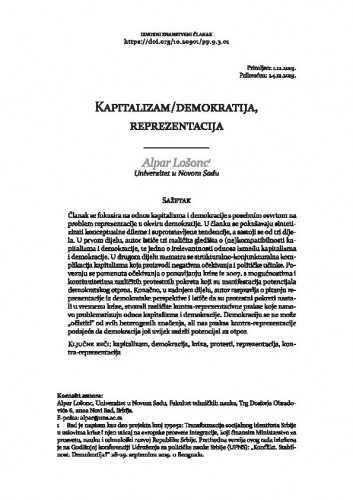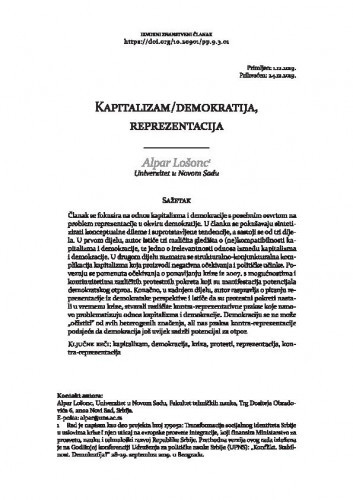Članak se fokusira na odnos kapitalizma i demokracije s posebnim osvrtom na problem reprezentacije u okviru demokratije. U članku se pokušavaju sintetizirati konceptualne dileme i suprotstavljene tendencije, a sastoji se od tri dijela. U prvom dijelu, autor ističe tri različita gledišta o (ne)kompatibilnosti kapitalizma i demokracije, te jedno o irelevantnosti odnosa između kapitalizma i demokracije. U drugom dijelu razmatra se strukturalno-konjunkturalna komplikacija kapitalizma koja proizvodi negativna očekivanja i političke učinke. Povezuju se pomenuta očekivanja o ponavljanju krize iz 2007. s mogućnostima i kontinuitetima različitih protestnih pokreta koji su manifestacija potencijala demokratskog otproa. Konačno, u zadnjem dijelu, autor raspravlja o pitanju reprezentacije iz demokratske perspektive i ističe da su protestni pokreti nastali u vremenu krize, stvarali različite kontra-reprezentativne prakse koje nanovo problematizuju odnos kapitalizma i demokracije. Demokraciju se ne može „očistiti“ od svih heterogenih značenja, ali nas praksa kontra-reprezentacije podsjeća da demokracija još uvijek sadrži potencijal za otpor.; The paper focuses on the relationship between capitalism and democracy, with particular reference to the issue of representation in the framework of democracy. Furthermore, the paper (that attempts to synthesize conceptual dilemmas and analyze conjunctural tendencies) consists of three parts. In the first part, I highlight four different views regarding the compatibility and incompatibility of capitalism and democracy, with the orientations that make this relationship irrelevant. In part two, I discuss the conjunctural crisis tendencies of capitalism that produce negative expectations and produce political effects. I relate these expectations to the recurrence of the crisis that broke out in 2007, and treat the continuity of the various protest struggles that indicate a significant manifestation of the potential of democracy's resistance. Finally, in the last part, I discuss the issue of representation from the perspective of democracy and build on the previous two chapters. I emphasize that the aforementioned movements, the protest groups created by the crisis, were simultaneously developing different counter-representation practices, again problematizing the relationship between capitalism and democracy. There is no way for democracy to be cleansed of its heterogeneous meanings. However, the practice of counter-representationreminds us that democracy still contains the potential for resistance.
Sažetak

 Političke perspektive : časopis za istraživanje politike : 9, 3 (2019) / glavna urednica Ana Matan.
Političke perspektive : časopis za istraživanje politike : 9, 3 (2019) / glavna urednica Ana Matan.